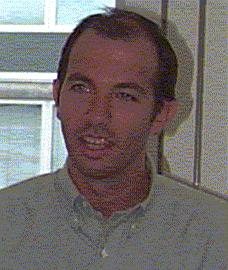The next Step: Exploring the Proteome:
Translation and Beyond
Biomedical applications of proteomics
Jean-Charles Sanchez, Ph.D., Head of
Geneva Proteomics Laboratory, Geneva University Hospital

Abstract:
The dream of having the complete genome sequence is now a reality. The complete sequence of several genomes including the human one is known. However, the understanding of probably half a million human proteins encoded by some 30,000 genes is still a long way away and the hard work to unravel the complexity of biological systems is yet to come. Understanding of complex and polygenic diseases including obesity, type 2 diabetes, cancer and cardiovascular disease requires taking into account and investigating different parameters determined by a number of genetic and environmental factors participating in the disorder processes.
Advances in molecular genetic approaches such as mutational analysis have now made it possible to start to identify susceptibility genes of these disorders. But so far, The search for candidate genes have been largely negative probably due to redundancy and compensatory mechanisms of other genes. Linear genetic strategies are thus not sufficient to predict specific phenotypes. The relationship between genome and phenome ("phenome is the physical manifestation of the organism, including its morphology, physiology and behavior ") is characterized by complex interactions between genes, gene products and environmental stimuli, also called since 1993 by Strohman "epigenetic regulation".
Genes are necessary but not sufficient. The development of new diagnostic and predictive tools for multi-factorial disorders as well as successful therapies will need the understanding of their fundamental biological mechanisms. This can be achieved under defined environmental conditions with strategies that combine genetic and proteomic tools.
Biographical sketch:
Jean-Charles Sanchez has been working since 1989 in the field of proteomics. He contributed in the development of two-dimensional polyacrylamide gel electrophoresis and related procedures and their application in biomedical research. Jean-Charles Sanchez has performed his Ph.D. in Biochemistry at the Buckingham University (UK) in the field of proteomics and diabetes. In 1990, he went to San Francisco, California, and completed a molecular biology certificate at the Berkeley University. During this two years period he also worked at Bio-Rad (Hercules, CA) in the electrophoresis R&D group. In 1997 he obtained a Business Administration diploma from the Officer School of Lausanne.
Since 1995, Jean-Charles Sanchez has been the head of the proteomics laboratory of the Central Clinical Chemistry Laboratory, Pathology department, Geneva University Hospital with Prof. Denis Hochstrasser as Director.
The activities in his group cover the development of the SWISS-2DPAGE database, the molecular scanner concept, the immuno-PCR detection method as well as for the discovery of new disease markers and drug targets in multi-factorial disorders including cancer, obesity and type II diabetes. Jean-Charles is the head of SWISS-2DSERVICE, a non-profit proteomics service and training association. Since 1993 he co-developed with Ron Appel and Denis Hochstrasser the SWISS-2DPAGE database.
Jean-Charles Sanchez is the author or co-author of 70 papers in refereed journals as well as 5 book chapters. He is the co-inventor of the immuno-PCR and molecular scanner patents as well as the main inventor of seven patents describing the discovery of new insulin resistance, obesity and diabetes markers as well as new drug targets. He is the co-founder of the SWISS-2DSERVICE association with Ron Appel and Denis Hochstrasser. In 2000 he co-founded GeneProt. He is a member of the Editorial board of Proteomics, Swiss Electrophoresis Society and the Executive Committee of SWISS-2DSERVICE.
Contact Information:
Jean-Charles Sanchez, Ph.D., Head of Geneva Proteomics Laboratory, Geneva University Hospital, 1211 Geneva 14, Switzerland. Cellular: +41 76 394 38 65, Fax: +41 22 372 73 99, Work: +41 22 372 73 74, e-mail: sanchez@dim.hcuge.ch.

